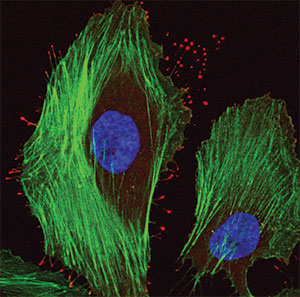An Introductory Course for Scientists and Those Interested in Science
June 9 – 13, 2014
Porter Neuroscience Research Center
35A Convent Drive
National Institutes of Health
Bethesda, MD
On this page:

Image of HeLa cells expressing mCherry-myosin 15 (red)
and stained with phalloidin (green) to reveal filamentous
actin and Hoechst stain (blue) to label nuclei. Myosin 15
moves along the actin filaments and concentrates at the tips
of finger-like filopodia. Mutations that interfere with this
activity are a cause of DFNB3 deafness in humans.
Credit: Melanie Barzik, NIDCD
Course overview
This free, week-long course, hosted and taught by scientists from the National Institute on Deafness and Other Communication Disorders (NIDCD), part of the National Institutes of Health (NIH), will provide students with an overall conceptual view of the auditory system as well as hands-on exposure to laboratory techniques unique to research on the inner ear.
The primary audience for this course is new intramural NIDCD trainees, including post-doctoral, graduate, post-baccalaureate, and summer students. The course will also be useful for scientists and other interested individuals who want to learn about concepts related to the auditory system.
The class is divided into two segments:
- A lecture session, usually in the mornings, in which NIDCD scientists introduce and discuss a wide array of concepts related to the auditory system. Each talk will begin with an overview of essential topics. Lectures are open to all who register.
- Afternoon hands-on laboratory experience. Participation in lab sessions is limited because of space and equipment; all spots for the lab sessions are currently full.
| Time | Mon June 9 | Tues June 10 | Wed June 11 | Thurs June 12 | Fri June 13 |
|---|---|---|---|---|---|
| 9:00 a.m.– 10:20 a.m. |
Lecture: Structure and function of the auditory system—Andy Griffith 35A/GF610 | Lecture: Development of the inner ear—Doris Wu 35A/GF610 | Lecture: Stereocilia structure—Bechara Kachar 35A/GF610 | Lecture: Lateral line—Katie Kindt 35A/GF610 | Lecture: Hair cell death/age related hearing loss/protection—Lisa Cunningham 35A/GF610 |
| 10:20 a.m.– 10:40 a.m. | Break | Break | Break | Break | Break |
|
10:40 a.m.–
|
Lecture: Structure and function of the vestibular system—Chris Zalewski 35A/GF610 | Lecture: Genetics of hearing loss—Tom Friedman 35A/GF610 | Lecture: Mechanotransduction— Gregory Frolenkov 35A/GF610 | Lecture: Hair cell regeneration—Mike Hoa 35A/GF610 | Lecture: Spiral ganglion —Tom Coate 35A/GF610 |
| Noon– 1:00 p.m. |
Lunch break | Lunch break | Lunch break | Lunch break | Lunch break |
| 1:00 p.m.– 6:00 p.m. |
Lecture: Auditory mechanics—Richard Chadwick 35A/GF610, 1:00 p.m.–2:00 p.m. |
Lab session: Dissection of cochlea and utricle—Matt Kelley/Lisa Cunningham | Lecture: Gene profiling/bioinformatics tutorial—Robert Morell 35A/GF610 | Lecture: Mouse genetics tutorial—Meghan Drummond 35A/GF610 | Lab session: Scanning Electron Microscopy—Inna Belyantseva/Gregory Frolenkov |
|
Lab session: Auditory Brainstem Response/Distortion Product Otoacoustic Emissions—Tracy Fitzgerald 35A/1D-915, |
Lab session: Paint fill tutorial and demonstration— Doris Wu | Lab session: Live imaging laboratory—Betsy Driver | Lab session: Porter Neuroscience Research Center Animal Facility—James McGehee, 2 hours per group Lab session: Zebrafish orientation—Katie Kindt, 2 hours per group |
Lab session: Transmission Electron Microscopy—Ronald Petralia |
Faculty
Inna Belyantseva, M.D., Ph.D.
Carmen Brewer, Ph.D.
Richard Chadwick, Ph.D.
Thomas Coate, Ph.D.
Lisa Cunningham, Ph.D.
Betsy Driver, Ph.D.
Meghan Drummond, Ph.D.
Tracy Fitzgerald, Ph.D.
Thomas Friedman, Ph.D.
Gregory Frolenkov, Ph.D.
Andrew Griffith, M.D., Ph.D.
Michael Hoa, M.D.
Bechara Kachar, M.D.
Matthew Kelley, Ph.D.
Katie Kindt, Ph.D.
Robert Morell, Ph.D.
Ronald Petralia, Ph.D.
Soumen Roy, Dr.rer.nat
Doris Wu, Ph.D.
Christopher Zalewski, M.A.
Contact information
All seats for lab sessions are currently full. Reservations are required for lecture sessions. To attend a lecture, contact:
Linda De Iberri
301-402-2829

PDF files require a viewer like the free Adobe Reader.

